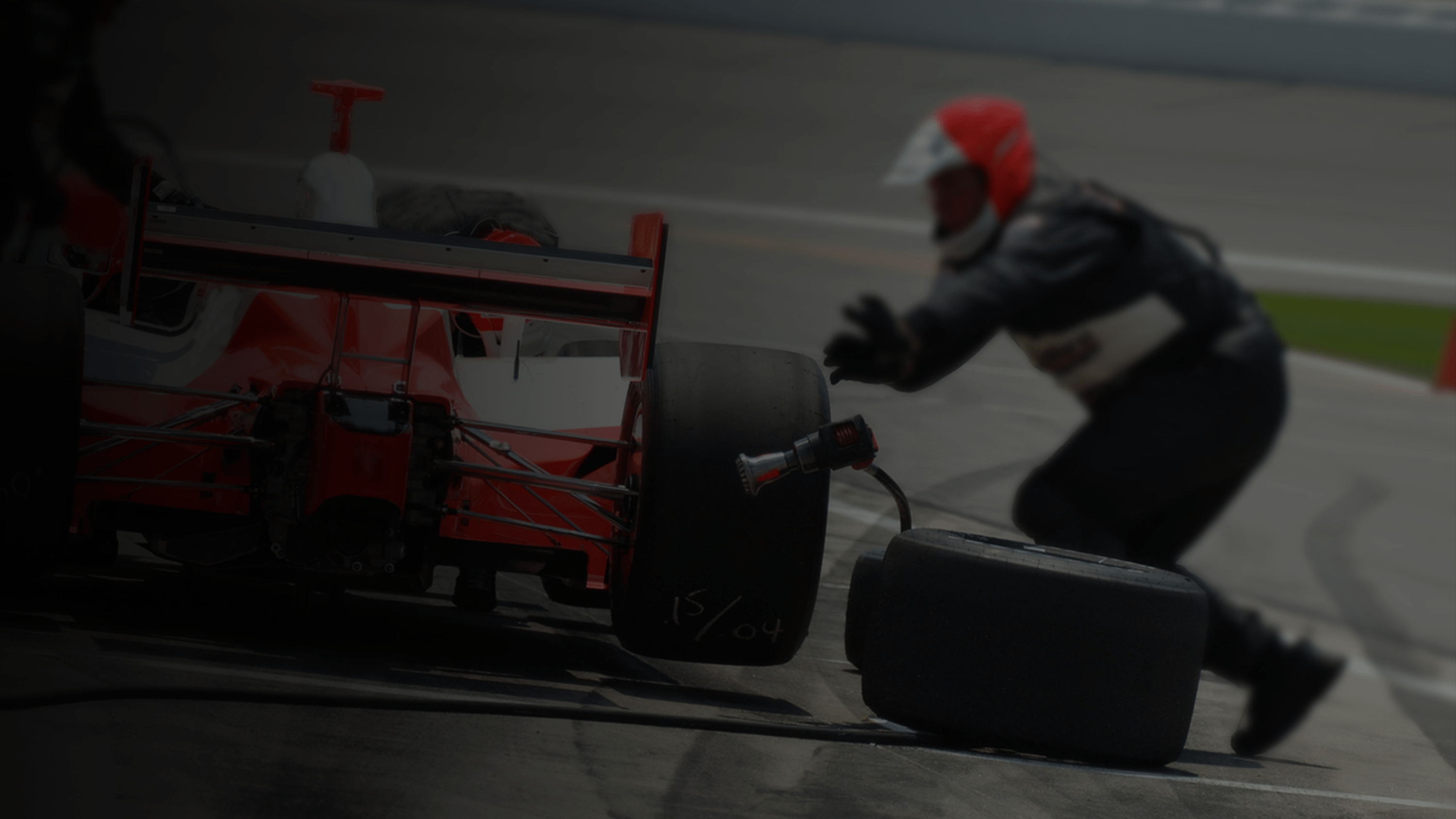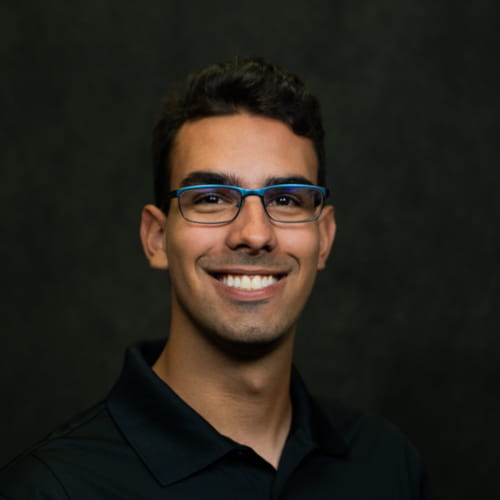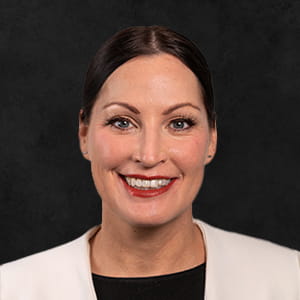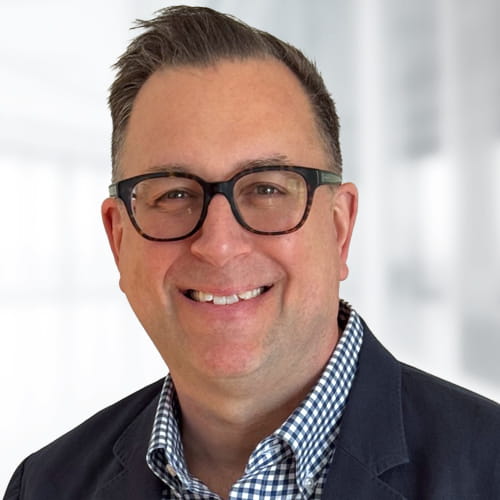
What If College Was Just a Pit Stop? An Interview With Luca Ranzani.
In this episode, Jim talks with Luca Ranzani, team captain of MRacing at the University of Michigan, about taking what he has learned in the classroom and building upon it in the real world. Listen to this week’s episode to learn more about how Luca applies his education and real-life experience to build racecars and lead his team, as well as our Electrifying the Future of Automotive Program.
Guest Profile

Luca Ranzani
Meet the Hosts

Kim Williams-Czopek
Episode 40: What If College Was Just a Pit Stop? - Transcript
Luca (00:00):
For the past couple years since COVID hit, we only focused here in the US in 2018. We went to Europe, so we competed in Spain. This year we're going to actually be going back to Europe. We are going to be competing in Hungary and Germany. So there's kind of a new set of, the rules are slightly different. So when we were designing a car that had down, and also there's, for me, the whole side of logistics, how we get a car out there, how we ship above the 28 students that are going to be going with the team? So it's a whole new challenge as well. Kind of early on to the question that you asked, like, what are some challenges I faced? Well, my biggest one this year is figuring out this whole European deal. So it's kind of pretty interesting to see, even designing a new car. Okay, maybe the car side doesn't change as much, but the team dynamic or the team experience does
Jim (00:52):
Welcome to What If? So What?, the podcast where we ask what's possible with digital and figure out how to make it real in your business. I'm Jim Hertzfeld, and today we'll ask What If?, So What? And most importantly, Now What? Hey everyone, we're here with Luca Ranzani, team captain of MR Racing. Luca, how are you doing today?
Luca (01:11):
I’m doing well.
Jim (01:11):
Great. I know you're super busy, so really appreciate you coming on the show and hearing your perspective. As a former engineering student to another one, I'd love to ask, what first drove you to study engineering? How'd you get into this program?
Luca (01:26):
Yeah, so I would say it was a mix of kind of wanting to problem-solve. Plus, I always kind of liked technical things. I liked the technical side of things. I was always curious about how mechanisms worked, or building things from scratch even. It's kind of like I got something, I would play with it and at one point I was like, okay, how does this work? And then I would take it apart, see how it worked back together. So it was kind of always a little bit of a curiosity there. Like how does, it's kind a natural thing.
Jim (01:52):
How do things work? Yeah. How they work. How do I make 'em better?
Luca (01:54):
Yeah.
Jim (1:55):
Did you at some point then figure out that you had to get good at math as well? Was that natural?
Luca (02:02):
Thankfully, I was always, yeah, I was always a fan of math, science, so that area was an easy transition. It wasn't a surprise. My grammar was always a little, eh, so when it came down to grammar, well, we are okay at communicating. I wouldn't say every engineer's perfect at it, but at least it was in my strong suit anyways.
Jim (02:23):
I can relate. I can relate now. That's great. And then, when you got into school, how did you discover this team and kind of what prompted you to get involved?
Luca (02:34):
Yeah, so I actually went to U of M, University of Michigan.
Jim (2:35):
Mm-Hmm. <Affirmative>
Luca (2:39):
because of the program.
Jim (02:41):
Oh wow! Okay.
Luca (02:43):
Yeah, I was doing robotics in high school. I already had some machining experience. I enjoyed building things. I was doing first FRC in high school and then one of my friends, him and I, we sometimes we would go to trade classes about machinery. Yeah. And he was familiar a lot more about the automotive side. So even coming from Georgia, he would mention kind the Auburn’s formal SA program. So I was like, okay, well let's do some research. What is this? What is formal SA? So I found a couple teams, I found a couple schools. When I visited U of M, I made sure to stop by and see the team. Luckily, a year later I was a research intern at U of M. So having more time on campus, I was like, well, let me stop by and talk to these people, see what they actually do, what's up with the project, and how do I get involved in a year, hopefully if I get in at the time. So I came by, I stopped, talked to some people on the team. It seemed like a very cool thing. Super exciting. We're building a brand new car from scratch every year. I like, that's cool. Yeah.
Jim (03:51):
That’s Awesome.
Luca (03:52):
As soon as I applied, I mentioned on my application. Once I got in I was like, sweet, I know what I want to do. And pretty much from day one of school, I've been involved.
Jim (4:03):
That's great.
Luca (4:04):
And I don't regret a single bit of it. It's been absolutely fantastic.
Jim (04:06):
So you didn't just sort of stumble into this, I mean, you were motivated, you were ready to go.
Luca (04:11):
Absolutely.
Jim (04:12):
From long ahead of time. That's great. So I'm sure you had high expectations. You know, by the way, just, I'm going to repeat this for everybody. You're building a car from scratch every year.
Luca (04:26):
Correct.
Jim (04:27):
That's incredible. You have to face all kinds of challenges. I mean, because you can't just build the same car every year either. So what are some of the sort of things you learned in that process? What are some of the challenges you faced? What are some things that you didn't expect?
Luca (04:37):
So I would say, like since I joined a team, a lot has changed both on the team side and also kind of on my personal side. I would like to say that I'm never the smartest person in the room. I'm not even close to that. But I do like to work. I like to work and I like to work a lot. So that kind of weighs in a little bit on my end. But when I joined the team, we were still combustion. So I joined M racing and at the time there were two teams. There was Michigan Electric racing and M racing, one building a combustion vehicle, the other one an electric vehicle. So I joined a combustion side, and at the time the team had just returned from an European competition and everybody was super dedicated. We didn't do great that year. That was 2018. We didn't do great that year. So, I came in and everybody had this huge energy of we have to turn to sail around. Yeah. <Laugh>. So I came in, everybody was super competitive. Everybody was super involved and super dedicated with that goal in mind. So it was kind of an interesting thing, like coming in from robotics and starting school and being like, oh wow, there's a different level competition. Also like, it brings in a new complex thing. We are building, it's a car. There's tons of electronics and sensors involved. Our engine itself, we do all the calibration, all the suspensions, designed inhouse, all the dynamics. As I'm in-house, we thankfully have great sponsors that give us like wind tunnel time or specific testing time. So, it was this huge immersion of a whole new world that I was completely unfamiliar with.
So my first year was pretty much a deep dive into learning. I wasn't in charge of anything specific. I wasn't designing anything specific. It was get involved with it as much as I can as soon as I can. So between my first and second year was a lot of kind of a huge step, steep learning curve to develop those skills. It was really interesting seeing kind of the team come in with that mindset of competition and translating that mindset into a competitive vehicle.
Jim (06:34):
Mm-Hmm. <affirmative>
Luca (06:35):
In my first year and second year, we won nearly every single dynamic event that we participated in. So it was like we were there with purpose. Yeah. And that carried over kind of throughout my years on the team as well. That that was the mindset that I grew up with, kind of where it continued. The second year I was involved with an actual system design. I was a suspension director for my second and third year on the team. So that was one side of the team that lacked the year prior MR 19 or 2019 competition vehicle. Didn't have great suspension. So as soon as I started, really my main job was, hey, what are the issues here? How do I figure this out? How to make it back. And it's starting new. I didn't have all the background knowledge and it's suspension and vehicle dynamics. Not really something like you learn in school <laugh>, right. Every day. It's not your countless class is not your chemistry and physics. It's kind of a mix of things. So, it was kind of a little bit of self-learning, learning from people that were on the team, like reaching out to people, like sponsors, Hey, you guys build race cars, what can you tell me about this? So, it's kind of like gathering every resource that I possibly could learning from that. And then actually trying to design a project. So, every year has kind of presented some new challenge from, I'm new and I need to learn a lot to, I need to now fix the system to something that works better. Or, hey, a couple years ago we just switched from combustion to electric. That was a huge jump. Yeah. How do we deal with this? And also from the personal side, learning how to work with the team. There's multiple people with different backgrounds. When we merged, we had the electric and the commotion side. Generally a little bit of a different mindset between the two. So how do you get everybody to work well together? So there was a lot of kind of growing throughout the years, both on the team end, how do we get better and better and better every year so we can, the competition it's best as well as kind of personal growth. Like, I need to work with a new set of people. I need to learn about this, I need to develop this skill. So, it's been a great, almost a little over five years.
Jim (08:56):
Sounds like you've learned probably more from this experience than you did may hesitate to say this in the classroom. Is that fair to say?
Luca (09:03):
<Laugh>? No, that's pretty, pretty correct if you asked nearly everyone that.
Jim (09:07):
Right.
Luca (09:08):
That's in the program. I would say they would agree with you on there. Not that they, what we learned in class was not valuable, not that it's also like the things that I was learning to do to apply for the team were the things that I would either later on the learning in class.
Jim (09:22):
Mm-hmm. <Affirmative>.
Luca (09:23):
So by the time I learned in class, I already had to apply it. Right. So it made that a whole lot easier. And sometimes it was the other way around too. It really matches well, like when I chose to go to University of U of M, one of the things that I wanted clear was I wanted to have a mix between the theoretical side and the application. I love the application, but you can't have either or if you have both, you have a really strong connection.
Jim (09:48):
Right.
Luca (09:48):
So that's kind of like the team was a great way to bridge that gap and school was a good way to bridge the other remaining gap. So <laugh> it watered out pretty well.
Jim (09:59):
Yeah. You're getting your mileage for your tuition, that's for sure. I think the interesting thing is just, you highlighted that the teamwork, the team has to come together. There's a lot of challenges that have to be perfectly balanced. You have to figure out all the tradeoffs. So you're designing your suspension, your aerodynamics, your powertrain, your engine, the motor, a lot of those things all have to come together. You've got personalities involved, not just the engineering. So those are things that you told me you can almost only learn through experience. Yes. That's a great story. When you guys kind of run into issues then, do you look outside? I mean, you mentioned your sponsors, but do you look outside even the automotive industry? Do you guys look to the old school engineers, the up and comers? Like it does Tesla or I don't know, some YouTube channel? Like how do you guys, where do you guys look outside for inspiration?
Luca (10:49):
Yeah, so we do have a pretty big library of documents that we have throughout the years. We've been around since 1986. So thankfully we have a wide range of alumni and,
Jim (11:02):
Okay.
Luca (11:03):
And a pretty good amount of documents saved. So that's generally your first base. Right. We reach out to people that we know. So we have, let's say someone here at my place of employment, prime Miller that they can help us out with Geo Dynamics. One of our alumni here does a lot of the aero design. So he generally hosts like design reviews with us where we can sit down and ask questions, review a couple of the ideas we had, make sure they make an attempt in some way before we really forward.
Jim (11:34):
Yeah.
Luca (11:34):
Exactly. But then also as you said, like there's a bunch of other resources online, we reach out to companies which reach out to.
Jim: (11:42):
Mm-hmm. <Affirmative>.
Luca (11:43):
Well sometimes YouTube might have an answer for what are you're looking for <laugh>.
Jim (11:47):
That’s surprising.
Luca (11:48):
Yeah. So thankfully what we are doing has been done at least once generally sometimes and we have something to reach out there. If it's something completely new, which we have done a couple things that were quite unique, then we kind of need to figure out, okay, this is new, it's not really something standard in the industry, how do we go about it? Then generally we approach more of, let's see if we can find out a couple different people that do this, see if there's a company that does something similar, and then branch out and try to kind of gather information and piece out a proper answer to this problem that we have or generate an idea from it.
Jim (12:27):
So you're really building a pretty interesting network. I mean a network that goes back almost 40 years in fact. Which is, which is pretty incredible.
Luca (12:35):
Yeah. It's definitely super helpful.
Jim (12:37):
Yeah. That goes a long way. So you've been committed to automotive, I think for or in mobility for a while now. Is it, what's your take on the industry? Where do you think automotive and mobility is going in the future?
Luca (12:50):
Well, there is a reason we switch out to electric. There's obviously a big drive to electric change. A lot of our sponsors that our automotive had already switched or starting projects and within the university we see more electrical focused projects come up, and within our competition as well. So former student is fairly strong here in the US. Multiple colleges and universities have it, and is also fairly strong around the world. Europe, Germany, Austria, et cetera. Probably have the strongest teams worldwide. So, the teams that we generally would compete with in combustion, most of them had already made the jump to electric.
Jim (13:29):
Mm-Hmm. <Affirmative>.
Luca (13:29):
So, it was kind of, okay, well we can continue doing combustion and be somewhat comfortable. I'm not going to say that we were comfortable within the competition, but it was a ground that we know, we know the rules of, we are familiar with it. Or we can take on a new challenge and try to explore this electrified automotive industry. Everything is going to racing I think is going to take a minute to change. I mean we do have like formal E now, but it still doesn't get the attention that formal one, it's counterpart, does. Or like the endurance championships. Those are all primarily combustion. I think there's going to be a while until the racing switches, the formal essay being a student focused program where people are not only competing but also learning a lot that might also have a spinoff technology that comes from it. It makes more sense to follow what the main industry is doing. So even though it's not directly what the racing industry is doing, it does make sense for us to make the leap. So, for us, it was a clear decision that that's what we wanted do based on kind of the world around us. Like if we look 10 years ago, you, you wouldn't really see that many electric cars driving around and in wild days you'll see Rivian, Teslas, you'll see if electric and hybrids nearly everywhere. So Yeah. There's already a big jump there within the automotive technology. So for us to kind of stay behind, we also fail a little bit on how we are preparing our students. It is a competition team. It is a highly involved team, but at the end of the day, we're all college students and as we graduate, we're probably going to join some industry. A lot of them go to aerospace, a lot of them go to automotive, it kind of branches off. But we want to make sure that we are preparing the students that are part of the team as best as we can. And if the industry and the world is going electric, well we might as well. Right.
Jim (15:27):
So where do you see yourself in 10 years?
Luca (15:30):
I personally, I grew up in Brazil country where racing is a pretty big culture. We have had pretty big race drivers, kind of being my favorite one as my childhood, even though it was a little bit before my time, but kind of grew up there. My family is from Italy so also pretty big fan base for a Ferrari for example.
Jim (15:53):
A little bit. Yeah. Yeah. A little bit famous.
Luca (15:55):
<Laugh> So for me racing was kind of always involved and kind of having the chance to participate in this as suspension director, as a general member, and as the team captain for the past two years. It kind of opens up a whole other side of opportunities. So nowadays, thanks for the opportunity here at PR Miller, but I've been interning here on the Motorsport side of the business since September. So my hope is to continue in motorsports. It's a field that I personally enjoy. I find it extremely fun and interesting. It's kind of like the thing like if you're having fun, are you really even working? That kind of deal. But like I enjoy a point where, I don't know, I can stick around. I don't mind.
Jim (16:35):
Well, I think we're going to see you in the on the championship podium, maybe behind the driver. Maybe you'll be driving.
Luca (16:41):
Yeah, probably behind the driver. I'm not a great driver. Yeah. I mean maybe on the road but not under track. I'm not lost. I can help other people get fast, but I'm personally not the fastest. But maybe as an engineer by the drivers, that might be a place that you see me in a couple of years
Jim (16:59):
That’s what we'll look for. Yeah. And we're going to see you at the, I will see you, I think you got a race coming up in, in May, right at internationals?
Luca (17:08):
Right. There's two competitions here in the US. One in May and one in June. May being a focus on the commotion side, I'll be still there kind of to, I don't know, scout out the field, see what people are doing, talk to a couple friends and colleagues I used to race against when we were a combustion. Then, we will be taking our car to competition itself in June. So we actually are going a little beyond. For the first couple years since COVID hit, we only focused here in the US. In 2018, we went to Europe, so we competed in Spain. This year we're going to actually be going back to Europe. We are going to be competing in Hungary and Germany. So, there's kind of a new set, the rules are slightly different. So, when we were designing the car, that had to be into account. Also, there's, for me, the whole side of logistics, how we get a car out there, how we ship about the 28 students that are going to be going with the team. So it's a whole new challenge as well. Kind of early on to the question that you asked, like what are some challenges faced, well my biggest one this year is figure out this whole European deal. So, it's kind of pretty interesting to see, even designing a new car. Okay, maybe, maybe the car side doesn't change as much, but the team dynamic or the team. experience does though. But, for this year, it'll be competing here in the US and later on also in Germany, Hungary.
Jim (18:30):
That sounds awesome. Well, great to talk to you Luca. Thanks for the thanks for the insight. Love your story and good luck. Good luck with the team. Good luck with your career. Good luck on the, you know, getting to the podium in 10 years.
Luca (18:42):
Awesome. Thank you. Alright,
Jim (18:43):
Take it easy.
Luca (18:45):
Thank you. You too.
(18:46):
You've been listening to What If? So What?, the Digital Strategy podcast from Perficient with Jim Hertzfeld and Kim Czopek. We want to thank our Perficient colleagues, JD Norman and Rick Bauer for our music today. Subscribe to the podcast and don't miss a single episode. You can find this season along with show notes at perficient.com. Thanks for listening.





